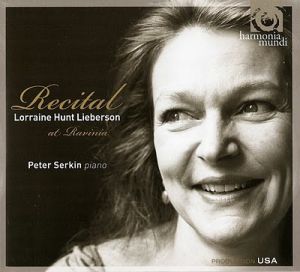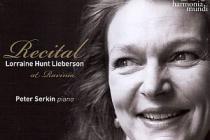
Why did we have to wait until after Lorraine Hunt Lieberson's passing to receive so many live, undoctored documents of her greatness? The live 2004 Ravinia performance of her husband Peter Lieberson's Rilke Songs (Bridge) was the first to arrive after the San Francisco-born mezzo died of cancer on July 3, 2006 at age 52. Then came her November 2005 live performance of her husband's Neruda Songs (Nonesuch). Since then, Spanish Love Songs from Caramoor 2004 (Bridge), two Wigmore Hall recitals from 1998 and 1999 (WHLive), John Harbison's North and South: Six Poems of Elizabeth Bishop (Naxos), a CD of her Handel and Bach at Emmanuel Music from 1992 and 1995 (Avie), and a just-released 1990 recording of Schumann songs and duets (Koch) have further cemented her reputation as the artistic equal of her two great English predecessors, Kathleen Ferrier and Janet Baker.
Now comes what some will consider the crown jewel: a wonderfully recorded August 5, 2004, recital from Chicago's Ravinia Festival that captures both voice and piano at their fullest. The performance begins with three songs by Brahms, and ends with Robert E. Telson's Calling You; from the Percy Adlon film Baghdad Café. In between come Handel, Debussy, Mozart, and a gratifyingly unaffected performance of Henry T. Burleigh's arrangement of Deep River.
If the performance of Brahms' Unbewegte laue Luft (Motionless balmy air), Op. 57, No. 8 only achieves 90 percent of the miraculous intimacy heard in her Wigmore Hall recital, it's undoubtedly because she took the risk of beginning the Ravinia concert with this emotional declaration of love. Once fully settled in, Hunt Lieberson invests her two other Brahms songs with unsurpassable communicative power.
Elly Ameling may be more radiant and exquisite in her phrasing of Ruhe, Süssliebchen, im Schatten (Rest, my love, in the shade), but Hunt Lieberson is warmer and more nurturing, and accompanist Peter Serkin's glistening treble tones create an especially magical instrumental counterpoint. In Von ewiger Liebe (Of eternal love), note her extraordinary intimacy and sweetness after the dramatic outpouring in the middle of the song. Ferrier, Baker, and others may have been equally compelling, but not greater.
That Hunt Lieberson makes so convincing a transition from the furious emotions of Handel's cantata La Lucrezia to the intimate sensuality of Debussy's Trois Chansons de Bilitis is miraculous. Few singers can ask so much of their instrument without sacrificing either smoothness or tonal beauty. Again and again, Serkin's tone is perfect, illuminated by sympathy and intelligence. Bonuses, besides a rare chance to hear excerpts from Mozart's Eine kleine deutsche Kantate (A little German cantata), include Hunt Lieberson's spoken introductions to the last three selections, and the final encore, Calling You. San Francisco Opera Orchestra cellist Emil Miland, who was one of Hunt Lieberson's closest friends, recalls visiting her in Santa Fe while she was ill. One day, Lorraine said to him, "I want to sing this for you." Seating herself at the piano, she performed the very same song. What a wonderful way to say farewell.

